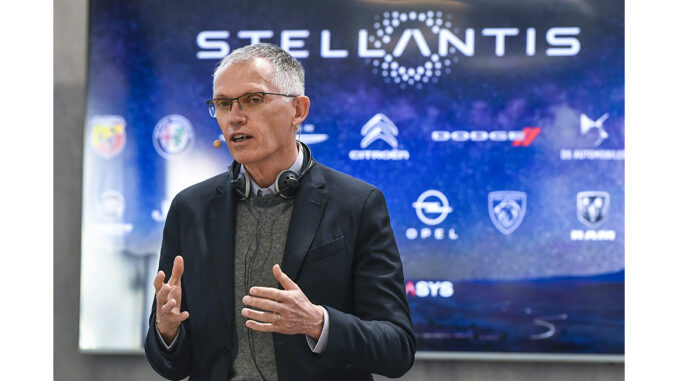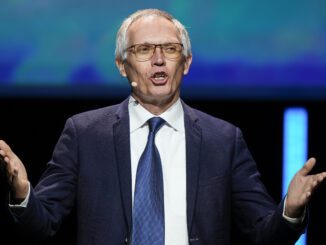
DETROIT — Struggling Jeep and Ram maker Stellantis is looking for a CEO to succeed Carlos Tavares, but the company says it’s just part of a normal leadership succession plan.
Tavares has been under fire from U.S. dealers and the United Auto Workers union after a dismal first-half financial performance when the company was caught off guard with too much high-priced inventory on dealer lots.
As head of PSA Peugeot, Tavares took control of the Netherlands-based company in January 2021 when it merged with Fiat Chrysler Automobiles. The company’s North American operations had been its main source of profits, but they have struggled this year amid larger market changes.
In a statement Monday, Stellantis said Tavares’ five-year contract is slightly over a year from its expiration date in 2026. “Given the importance of the position, it is normal for a board to look into the subject with the necessary anticipation without this having an impact on future discussions,” the statement said. The company added that it’s possible Tavares will stay on longer.
However, Erik Gordon, a University of Michigan business and law professor, said the company’s confirmation of the search likely means that the board has reached a deal for Tavares to leave.
“I think they recognize that it’s best for the company to have a new CEO,” said Gordon, who has advised corporations on leadership succession plans. “Stellantis is taking a lot of hits within the U.S.”
Companies try to change leaders peacefully and organizedly, he said. They don’t want it to look like chaos or panic. They want it to look like this is the normal, responsible way we do things.”
Tavares has been trying to cut costs, delaying some factory openings, laying off union workers and offering buyouts to salaried employees.
The company reported that first-half net profits were down 48% compared to last year’s period. First-half sales in the U.S. were down nearly 16%, even though new vehicle sales rose 2.4% overall.
Growing dealer inventory and high prices drew a rebuke from the head of the U.S. Dealers Council, who called on the company to boost discounts to move vehicles off their lots.
When the company told the auto workers union that it would delay plans to reopen a factory and build a new electric vehicle battery plant in Belvidere, Illinois, UAW President Shawn Fain called for Tavares to be fired. The company agreed to the plans in a new contract with the UAW signed after a six-week strike last fall.
The union has filed grievances and threatened to strike over the delays, which the company says are necessary due to market conditions in the U.S. Fain blamed the problem on poor leadership from Tavares and said General Motors and Ford are still performing well.
The company says it intends to meet its commitment to reopen Belvidere and build the battery plant, but it needs delays due to slowing sales.
Stellantis said it already is working with dealers to reduce inventory, and their efforts boosted sales in August.
Chief Financial Officer Natalie Knight told a Bank of America conference on Monday that the company is pleased with the progress in reducing inventory on dealer lots.
In the U.S., for example, Stellantis had just over 430,000 vehicles in its inventory at the end of June. That number was reduced by 40,000 in July and August, and the company has set a target of cutting it by a total of 100,000 by the start of next year. “We’re going to continue to see reductions in September and throughout the year,” she said. Tavares told reporters during the summer that the global auto industry is caught between consumers looking for more affordable vehicles and demands more capital spending to develop new electric and gas-powered vehicles.
In North America, Tavares conceded that Stellantis let inventory get too high and plans to fix that in the first half didn’t work. Sticker prices, he said, are too lofty and often send customers fleeing from showrooms early in the shopping process even though discounts are available.
Several U.S. executives, including the heads of the Jeep, Dodge and Ram brands, have left the company in recent months.
In March, the company said it would lay off 400 white-collar workers in the U.S. due to the transition from combustion engines to electric vehicles. In November 2023, the company made buyouts and early retirement offers to 6,400 nonunion salaried workers. It has not said how many took the offers.


